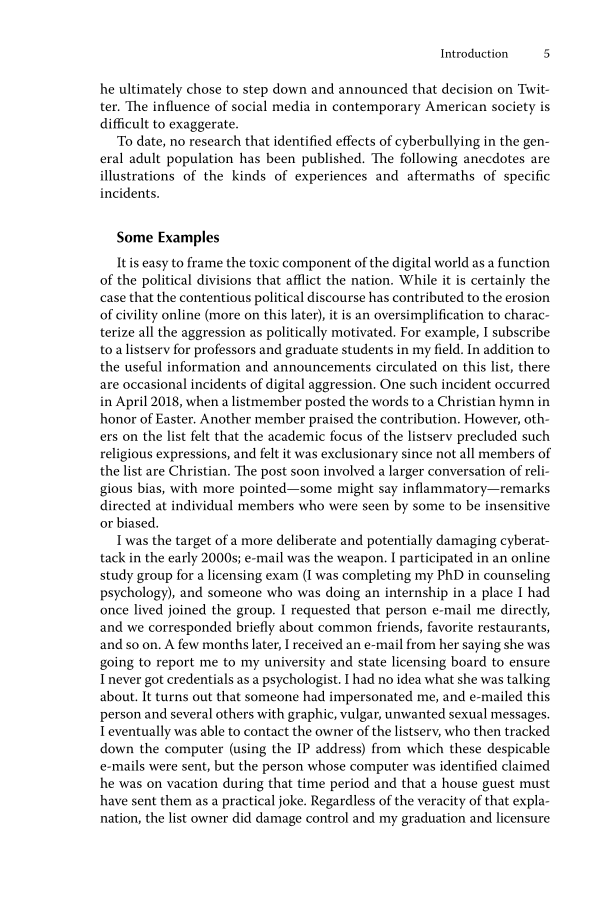Introduction 5 he ultimately chose to step down and announced that decision on Twit- ter. Th e infl uence of social media in contemporary American society is diffi cult to exaggerate. To date, no research that identifi ed eff ects of cyberbullying in the gen- eral adult population has been published. Th e following anecdotes are illustrations of the kinds of experiences and aftermaths of specifi c incidents. Some Examples It is easy to frame the toxic component of the digital world as a function of the political divisions that affl ict the nation. While it is certainly the case that the contentious political discourse has contributed to the erosion of civility online (more on this later), it is an oversimplifi cation to charac- terize all the aggression as politically motivated. For example, I subscribe to a listserv for professors and graduate students in my fi eld. In addition to the useful information and announcements circulated on this list, there are occasional incidents of digital aggression. One such incident occurred in April 2018, when a listmember posted the words to a Christian hymn in honor of Easter. Another member praised the contribution. However, oth- ers on the list felt that the academic focus of the listserv precluded such religious expressions, and felt it was exclusionary since not all members of the list are Christian. Th e post soon involved a larger conversation of reli- gious bias, with more pointed—some might say infl ammatory—remarks directed at individual members who were seen by some to be insensitive or biased. I was the target of a more deliberate and potentially damaging cyberat- tack in the early 2000s e-mail was the weapon. I participated in an online study group for a licensing exam (I was completing my PhD in counseling psychology), and someone who was doing an internship in a place I had once lived joined the group. I requested that person e-mail me directly, and we corresponded briefl y about common friends, favorite restaurants, and so on. A few months later, I received an e-mail from her saying she was going to report me to my university and state licensing board to ensure I never got credentials as a psychologist. I had no idea what she was talking about. It turns out that someone had impersonated me, and e-mailed this person and several others with graphic, vulgar, unwanted sexual messages. I eventually was able to contact the owner of the listserv, who then tracked down the computer (using the IP address) from which these despicable e-mails were sent, but the person whose computer was identifi ed claimed he was on vacation during that time period and that a house guest must have sent them as a practical joke. Regardless of the veracity of that expla- nation, the list owner did damage control and my graduation and licensure
Document Details My Account Print multiple pages
Print
You have printed 0 times in the last 24 hours.
Your print count will reset on at .
You may print 0 more time(s) before then.
You may print a maximum of 0 pages at a time.




















































































































































































